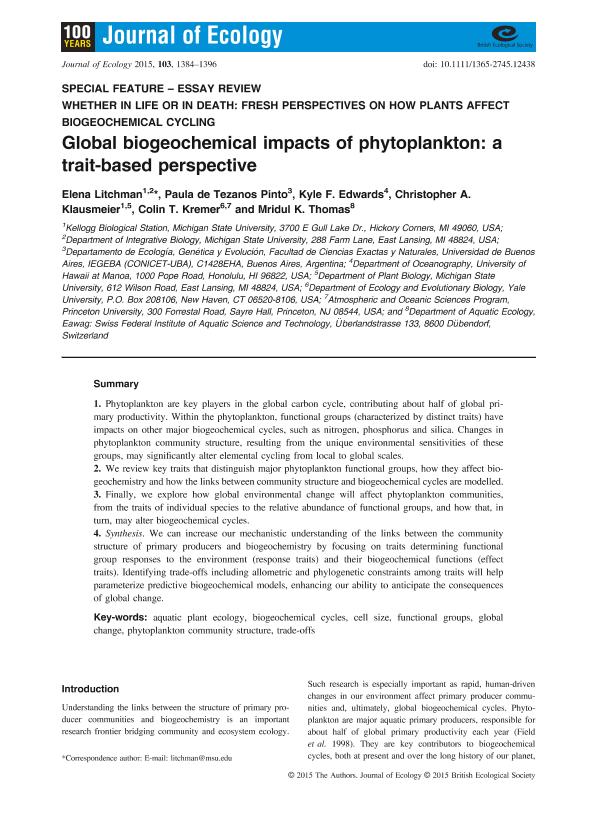Mostrar el registro sencillo del ítem
dc.contributor.author
Litchman, Elena
dc.contributor.author
de Tezanos Pinto, Paula

dc.contributor.author
Edwards, Kyle F.
dc.contributor.author
Klausmeier, Christopher A.
dc.contributor.author
Kremer, Colin T.
dc.contributor.author
Thomas, Mridul K.
dc.date.available
2018-09-19T19:08:24Z
dc.date.issued
2015-11
dc.identifier.citation
Litchman, Elena; de Tezanos Pinto, Paula; Edwards, Kyle F.; Klausmeier, Christopher A.; Kremer, Colin T.; et al.; Global biogeochemical impacts of phytoplankton: A trait-based perspective; Wiley Blackwell Publishing, Inc; Journal of Ecology; 103; 6; 11-2015; 1384-1396
dc.identifier.issn
0022-0477
dc.identifier.uri
http://hdl.handle.net/11336/60285
dc.description.abstract
Phytoplankton are key players in the global carbon cycle, contributing about half of global primary productivity. Within the phytoplankton, functional groups (characterized by distinct traits) have impacts on other major biogeochemical cycles, such as nitrogen, phosphorus and silica. Changes in phytoplankton community structure, resulting from the unique environmental sensitivities of these groups, may significantly alter elemental cycling from local to global scales. We review key traits that distinguish major phytoplankton functional groups, how they affect biogeochemistry and how the links between community structure and biogeochemical cycles are modelled. Finally, we explore how global environmental change will affect phytoplankton communities, from the traits of individual species to the relative abundance of functional groups, and how that, in turn, may alter biogeochemical cycles. Synthesis. We can increase our mechanistic understanding of the links between the community structure of primary producers and biogeochemistry by focusing on traits determining functional group responses to the environment (response traits) and their biogeochemical functions (effect traits). Identifying trade-offs including allometric and phylogenetic constraints among traits will help parameterize predictive biogeochemical models, enhancing our ability to anticipate the consequences of global change. We can increase our mechanistic understanding of the links between the community structure of primary producers and biogeochemistry by focusing on traits at different organisational levels that determine the responses to the environment (response traits) and their biogeochemical functions (effect traits). Identifying trade-offs including allometric and phylogenetic constraints among traits will help parameterize predictive biogeochemical models, enhancing our ability to anticipate the consequences of global change.
dc.format
application/pdf
dc.language.iso
eng
dc.publisher
Wiley Blackwell Publishing, Inc

dc.rights
info:eu-repo/semantics/openAccess
dc.rights.uri
https://creativecommons.org/licenses/by-nc-sa/2.5/ar/
dc.subject
Aquatic Plant Ecology
dc.subject
Biogeochemical Cycles
dc.subject
Cell Size
dc.subject
Functional Groups
dc.subject
Global Change
dc.subject
Phytoplankton Community Structure
dc.subject
Trade-Offs
dc.subject.classification
Otras Ciencias Biológicas

dc.subject.classification
Ciencias Biológicas

dc.subject.classification
CIENCIAS NATURALES Y EXACTAS

dc.title
Global biogeochemical impacts of phytoplankton: A trait-based perspective
dc.type
info:eu-repo/semantics/article
dc.type
info:ar-repo/semantics/artículo
dc.type
info:eu-repo/semantics/publishedVersion
dc.date.updated
2018-09-19T14:34:43Z
dc.journal.volume
103
dc.journal.number
6
dc.journal.pagination
1384-1396
dc.journal.pais
Reino Unido

dc.journal.ciudad
Londres
dc.description.fil
Fil: Litchman, Elena. Michigan State University; Estados Unidos
dc.description.fil
Fil: de Tezanos Pinto, Paula. Consejo Nacional de Investigaciones Científicas y Técnicas. Oficina de Coordinación Administrativa Ciudad Universitaria. Instituto de Ecología, Genética y Evolución de Buenos Aires. Universidad de Buenos Aires. Facultad de Ciencias Exactas y Naturales. Instituto de Ecología, Genética y Evolución de Buenos Aires; Argentina
dc.description.fil
Fil: Edwards, Kyle F.. University of Hawaii at Manoa; Estados Unidos
dc.description.fil
Fil: Klausmeier, Christopher A.. Michigan State University; Estados Unidos
dc.description.fil
Fil: Kremer, Colin T.. University of Princeton; Estados Unidos. University of Yale; Estados Unidos
dc.description.fil
Fil: Thomas, Mridul K.. Swiss Federal Institute of Aquatic Science and Technology; Suiza
dc.journal.title
Journal of Ecology

dc.relation.alternativeid
info:eu-repo/semantics/altIdentifier/doi/http://dx.doi.org/10.1111/1365-2745.12438
dc.relation.alternativeid
info:eu-repo/semantics/altIdentifier/url/https://besjournals.onlinelibrary.wiley.com/doi/abs/10.1111/1365-2745.12438
Archivos asociados
